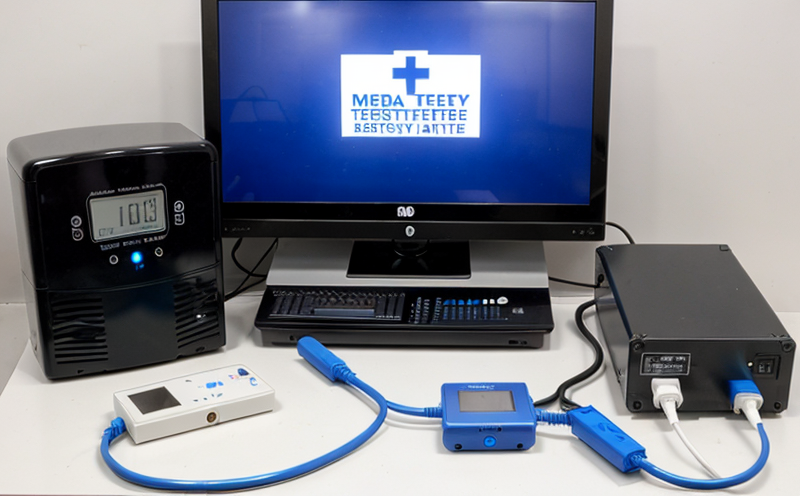DIN EN 62133-2 Medical Device Rechargeable Battery Testing
The DIN EN 62133 series of standards provides comprehensive guidance on the safety and performance testing of rechargeable batteries used in medical devices. This stringent set of regulations is designed to ensure that all battery systems integrated into these devices operate reliably, safely, and without risk to patients and healthcare professionals.
DIN EN 62133-2 specifically addresses the electrical safety aspects of rechargeable batteries intended for use in portable medical equipment such as defibrillators, pacemakers, and other life-supporting devices. Compliance with this standard is crucial for manufacturers who wish to ensure that their products meet regulatory requirements set by global bodies like the FDA (United States) or CE Mark certification (Europe).
The standard covers various key areas including electrical insulation, protection against over-temperature conditions, short circuit protection mechanisms, and battery management systems. It also mandates rigorous testing procedures for ensuring that batteries perform consistently under normal operating conditions but are also capable of handling extreme scenarios without compromising safety.
One of the primary reasons why compliance with DIN EN 62133-2 is essential lies in its focus on preventing failures that could lead to serious health issues. For instance, improperly tested or poorly designed batteries may fail during critical moments, causing harm to patients who rely heavily on these devices for survival.
Moreover, adhering to this standard helps manufacturers protect their brand reputation and avoid costly recalls. Non-compliance can result in product bans, fines, lawsuits, and damage to consumer trust—issues that are particularly detrimental given the high stakes involved when dealing with medical technology.
In summary, DIN EN 62133-2 plays a vital role in safeguarding public health by setting strict guidelines for testing rechargeable batteries used in medical devices. By ensuring compliance through rigorous evaluation processes, this standard contributes significantly to improving overall patient safety and reliability of healthcare technologies.
| Standard Section | Description |
|---|---|
| Ideal Battery Performance | Ensures optimal performance under various operating conditions. |
| Short Circuit Protection | Tests the battery's ability to protect against short circuits which could cause fires or explosions. |
Why It Matters
The importance of DIN EN 62133-2 cannot be overstated, especially considering the critical role that medical devices play in modern healthcare. These instruments often involve patients who are already vulnerable due to illness or injury; therefore, any failure could have severe consequences.
- Life-Saving Equipment: Many medical devices depend on reliable batteries for their operation, making battery integrity paramount.
- Patient Safety: Ensuring that these batteries function correctly reduces the risk of adverse events such as equipment malfunctions during critical procedures.
- Brand Reputation: Compliance demonstrates a commitment to quality and patient safety, enhancing brand credibility.
A failure in any part of the battery system could result in life-threatening situations. For example, if a defibrillator's battery were to degrade unexpectedly, it might fail just when needed most—during an emergency where every second counts. This underscores why stringent testing is non-negotiable for manufacturers.
Additionally, adhering to such standards fosters trust between healthcare providers and patients regarding the efficacy and safety of devices they use daily. It also ensures that regulatory bodies like the FDA or EMA view your products favorably when considering approvals.
Applied Standards
DIN EN 62133-2 is part of a broader family of standards focused on the safety and performance requirements for batteries used in various applications, including medical devices. This particular standard focuses exclusively on rechargeable batteries employed within portable medical equipment.
| Standard | Description |
|---|---|
| DIN EN 62133-2:2018-09 | Defines the safety requirements for rechargeable cells and batteries used in portable medical devices. |
| IEC 62133:2015 | An international standard that complements DIN EN 62133, providing additional guidance on battery design and testing. |
The combination of these standards ensures comprehensive coverage of all relevant aspects related to rechargeable batteries in medical devices. They cover everything from initial design considerations right through to final product evaluation.
Why Choose This Test
- Regulatory Compliance: Ensures adherence to stringent international regulations, thereby streamlining the approval process.
- Patient Safety: Reduces risks associated with device failures, enhancing overall patient care.
- Brand Protection: Maintains and enhances brand reputation by demonstrating a strong commitment to quality and safety.
- Market Access: Facilitates easier entry into markets that require strict compliance with these standards.
Beyond mere regulatory requirements, choosing DIN EN 62133-2 battery testing offers several advantages. It provides peace of mind knowing that your product meets the highest industry standards. Furthermore, it positions you ahead of competitors by showcasing superior attention to detail and commitment towards patient safety.
Moreover, this rigorous testing process helps identify potential weaknesses early on in development stages, allowing for necessary improvements before mass production begins. This proactive approach not only improves product quality but also saves time and resources that would otherwise be spent addressing issues post-launch.





